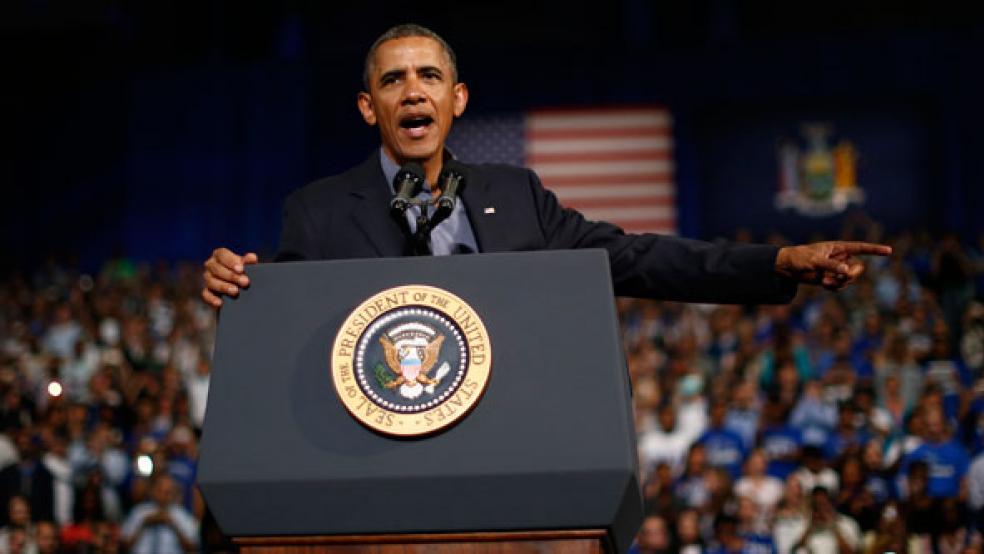President Obama on Wednesday hailed the progress made by blacks and other minorities in the 50 years since the Rev. Martin Luther King, Jr., addressed the historic March on Washington.
But the first U.S. black president cautioned that black America “would dishonor” the memory of martyred civil rights heroes like King and Medgar Evers by growing complacent in the struggle for economic parity for blacks and preservation of their voting rights and other hard-won protections.
RELATED: THE MARCH ON WASHINGTON, 1963: 15 INDELIBLE IMAGES
Standing on the rain-splashed steps of the Lincoln Memorial where King delivered his “I Have a Dream” speech, Obama told the gathered throngs, “The arc of the moral universe may bend towards justice, but it doesn’t bend on its own.”
“To secure the gains this country has made requires constant vigilance, not complacency,” Obama said. “Whether it’s by challenging those who erect new barriers to the vote or ensuring that the scales of justice work equally for all in the criminal justice system and not simply a pipeline from underfunded schools to overcrowded jails, it requires vigilance.”
WEIGHTED REMEMBRANCE
Accompanied by First Lady Michelle Obama and former Democratic presidents Bill Clinton and Jimmy Carter, Obama walked down the memorial steps and past a cast iron bell from a Birmingham, Ala., church that survived a bombing that killed four black school girls in September 1963. He recalled the spirit of young people of that period – including John Lewis, who fought for civil rights on the front lines and in Congress – as pivotal in transforming rhetoric into reality.
“That was the spirit that would sustain them through the campaigns to come, through boycotts and voter registration drives and smaller marches, far from the spotlight…” Obama said today. “Through setbacks and heartbreaks and gnawing doubt, that flame of justice flickered and never died.”
RELATED: FOR TOO FEW, KING’S SPEECH HAS BECOME A REALITY
Obama added, “Because they kept marching, America changed. Because they marched, the civil rights law was passed. Because they marched, the voting rights law was signed… Because they marched, city councils changed and state legislatures changed and Congress changed and, yes, eventually the White House changed.”
Elected to a second term last November after a bitter battle with Republicans over economic policy and spending on education, health care and other social programs, Obama noted today that even as many racial barriers have fallen and the nation has grown wealthier and better educated, the economic disparities between blacks and whites remain substantial.
In thinly veiled attacks on his GOP foes, Obama complained, “We’d been told growing inequality was the price for a growing economy, a measure of the free market – that greed was good and compassion ineffective, and those without jobs or health care had only themselves to blame...“Then there were those elected officials who found it useful to practice the old politics of division, doing their best to convince middle-class Americans of a great untruth, that government was somehow itself to blame for their growing economic insecurity…”
The March on Washington 50 years ago was as much about a fight by blacks for jobs, decent wages and fair working conditions as it was about civil rights. Obama cited as setbacks the Supreme Court’s decision in June to strike key provisions of the 1965 Voting Rights Act and the high rates of African American incarceration. “Yes, there have been examples of success within black America that would have been unimaginable a half-century ago,” the president said. “But... black unemployment has remained almost twice as high as white [unemployment], Latino unemployment close behind. The gap in wealth between races has not lessened, it’s grown.”
WITNESSES TO HISTORY
Some of those present on Wednesday had also been present at King’s speech, and echoed Obama’s observations that blacks’ economic and social progress has come in fits and starts – and must be carefully guarded.
John Applewhite, a 68-year-old from North Carolina, came to Washington in 1963 when he was 18. He recalled listening to King from a nearby tree and how the crowd was transfixed by his words. “There were hundreds of thousands of people there, but when King spoke, you could hear a pin drop. It was such a different atmosphere back then,” Applewhite said. “We’ve made great progress as a country in some areas, but in some respects, it hasn’t really changed.”
The Rev. Hennie Brown, 80, a minister from South Carolina, who was also present at King’s historic speech, agreed. “It’s gotten better, but racism is going to be around for a long time.”
Both men said while the election of the country’s first black president was a giant step in the right direction, it hasn’t helped blacks as much as they had thought it would. “We have a problem with color,” Applewhite said. “We see color. We don’t see people.”
He added, “I don’t care who is president. The people are still the ones out here every day. We’re the ones that have to get along.”
A few in the crowd argued Obama’s election actually has “hindered” the nation’s progress in eliminating inequality. “Since he’s been president, a lot of bad things have been going on. People are a lot more angry,” said Jackie Jones, a resident of Largo, MD, who came to the National Mall with her sister to watch the president speak on their lunch break.
“We’re looking at it like once he’s gone it will go back to normal,” Jones said.






